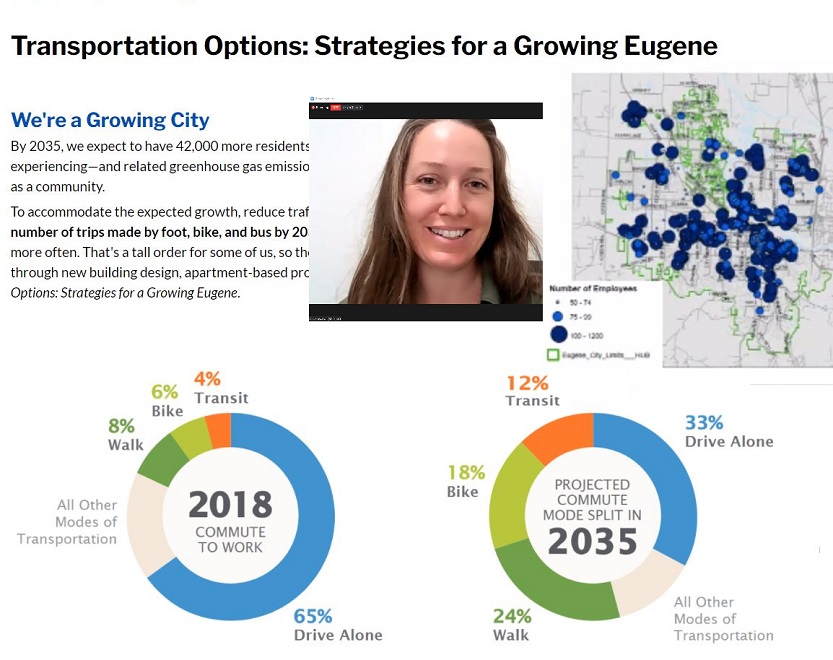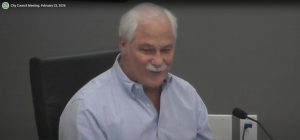August ATC suggests ways Eugene can triple its active transportation trips
6 min read
How can we triple the number of bus, bike, and walking trips in Eugene? Cas Casados asked the Active Transportation Committee in August.
Cas Casados: Transportation Options: Strategies for a Growing Eugene is trying to make active transportation choices more convenient, in order to reduce drive-alone trips. And it’s doing that through looking at employee commutes, multifamily housing, and new construction.
[00:00:18] John Q: At the August meeting of the Active Transportation Committee, the City’s Cas Casados.
[00:00:24] Cas Casados: The city is growing rapidly and we are expected to add about 42,000 new residents in the coming 12 years. And in order to not have our roads be filled with cars, we need to start providing some other options around the city and really supporting those options at places of employment and at multi-family housing developments and in new developments around town.
Our transportation system plan includes tripling the number of trips by walking, biking and transit by 2035. We’ve got climate action plan goals that we’re also working on through this project. And as developers are building throughout the city, how we can successfully integrate transportation options into the construction from the get-go, so it’s not something that we’re adding later.
[00:01:21] John Q: Cas said the Portland ECO rule is likely to be adopted by the state.
Thank you for supporting
local citizen journalism
[00:01:26] Cas Casados: Some of you may have heard about the Portland ECO rule. Employers that have a hundred or more employees at a work site are required to provide transportation options, programs, and infrastructure. However, they have options for how they decide to do it. And this rule is being taken up by the state and likely going to be expanded statewide probably by about 2022.
Are there programs or options you think would move the needle or that you would like to see on a menu of options that employers can choose from?
[00:02:07] Daniel Wilson: You have a lot of good things here. Something that occurred to me, would be showers.
[00:02:12] Andrew Martin: I saw you had on there, classes that they could offer their employees. So I think like a standardized curriculum, if the city could develop appropriate curriculum, I think that might be really helpful to employers.
[00:02:23] Allen Hancock: Our roads are only good as their maximum capacity. And so to the extent that we can spread out traffic during different times of the day, It means we can use what we have better. I would like to see something added some kinds of incentives to be able to, with the larger employers especially, to encourage staggered work hours that are not nine to five or other kind of common times.
[00:02:51] Susan Wolling: I went on a tour of the Northwest Credit Union building and I was really impressed with what they offered to encourage active transportation. You come in and it’s raining and you’ve got wet clothes and packs and stuff, it’s yes, we recognize that you’re going to have these needs, and therefore, we’re gonna give you a place someplace to let your gear hang to dry and, you can look presentable when you come in.
[00:03:14] Mary Christensen: Maybe there could be some standards like the City is always trying to go for the gold or platinum, or whatever it may be. There’s that kind of a rating for businesses as well that they’re trying to achieve.
[00:03:26] Josh Kashinsky: Not every place is going to be able to put in showers, especially if you’re a five person office. But if there’s some way that you can pool resources with close businesses or residences, that might be great. Something the program sub-committee did a couple of years ago was to help businesses become Travel Oregon Bike Friendly Businesses.
[00:03:47] Steve Abbott: Cas, I’m not sure if I saw secure bike parking on the list, but that certainly is a big barrier for cycling commuters. And I think for the big employers it’s something that is fairly easy for them to provide, they probably have the real estate for that. For mid to smaller employers, it’s a challenge. They may not have the space, the real estate or the funds. And that’s the role that the city could become heavily involved in, as providing the service, even attended bike / secure bike parking would be a big boon.
[00:04:15] Pete Knox: Right now all the incentives, as it were, are set up to drive. When I lived in Seattle, for example, lot of people took transportation downtown because parking was incredibly expensive. So I hate to say this, there’s a lot of nice, positive things on the list, but sometimes there might need to be some kind of economic incentives to move people to go, ‘ Uh, Yeah, maybe walking, biking, or taking the bus might be a good idea.’
[00:04:42] Andrew Martin: It’s going to be really important for the city, given the big menu, to get data on how well this is actually working, so I’d be really interested in how you all can work in data collection so that you can continue to refine this work in the coming years.
[00:04:57] Daniel Wilson: Transportation is, far and away Lane County’s biggest contribution in terms of greenhouse gases. I think the biggest piece that is missing here, is the incentive structure. If we just allow people to do what’s comfortable, then we’re going to just continue to see accelerating climate change. What will get people to change in a way that is meaningful?
[00:05:17] Josh Mendez: Looking at ridership across cities with great networks, bike infrastructure, transit systems and you look at these graphs over time and the only one that was increasing, ridership was increasing in Seattle when they put in the congestion pricing, making it harder for people to drive. There’s a interesting documentary about Dutch biking and they were asking the people, why do you bike? If you really liked biking? It’s ‘No, I don’t really like biking, but it’s just the simplest option. I’d rather drive but just because it’s more inconvenient for me to drive, I don’t do it.’ So I think we really need to, unfortunately it sounds weird, but we have to make driving less convenient.
[00:05:54] Cas Casados: Thanks Josh. Yes. (laughs) Sometimes we’re unaware of the water we’re swimming in and we’re swimming in water where car usage has been greatly incentivized and sometimes we don’t realize all the incentives that have been given. Currently that City Council doesn’t have an approach that has an orientation towards disincentivizing driving.
[00:06:16] John Q: Cas said the project also offers a menu of options for new developments, such as multi-family housing.
[00:06:24] Cas Casados: There are a variety of things that developers could choose to do. And just like before, having a menu of options. And then of course, what sort of services the city could potentially offer: materials, education programs, classes, gamification, contests, monitoring, support groups, surveying participants, setting of goals in relationship with the city’s goals for meeting our climate targets, and potentially doing site visits, consultations… I’d also like to hear if you have more ideas on that as well.
[00:07:07] Susan Wolling: Yeah, for the multi-family housing, have you rent your parking space separate from your unit so that you can reduce your rent if you don’t need to park your car. Or maybe you could rent your parking space to somebody else. I think that would help a lot to make people at least consider not using a car. And then having Car Share available. If you really could have access to a car without actually owning one, that would make a lot of difference, I think, for a lot of people.
[00:07:31] Steve Abbott: Some of the city’s goals are to do compact multi-unit development, and then that runs afoul of other neighbors that are not happy about seeing increasing density. So if a developer is proposing things that really meet the city’s goals in a number of ways, climate goals, transportation goals, a rating system that the city can use, lessening some of the neighborhood resistance, maybe come out with a decision, says this meets a hundred percent of our requested transportation demand management goals.
[00:08:04] Josh Kashinsky: There has to be a way after the development is complete to check and make sure people have actually implemented the TDM requirements.
[00:08:14] Mary Christensen: I had a question about the capacity of the Transportation Options staff or City staff to work with the individual buildings or businesses and multi-use people.
[00:08:26] Cas Casados: I appreciate your question, Mary. It’s a lot of work. Cities around the country who do this kind of work, they have dedicated staff that do the monitoring, that run the programming that is being offered citywide, who produce materials and the consultations.




